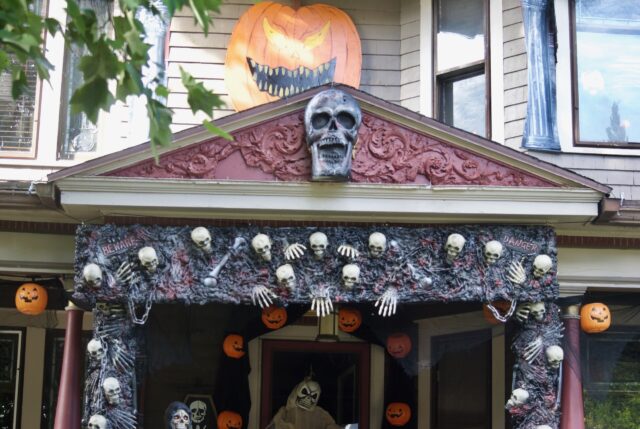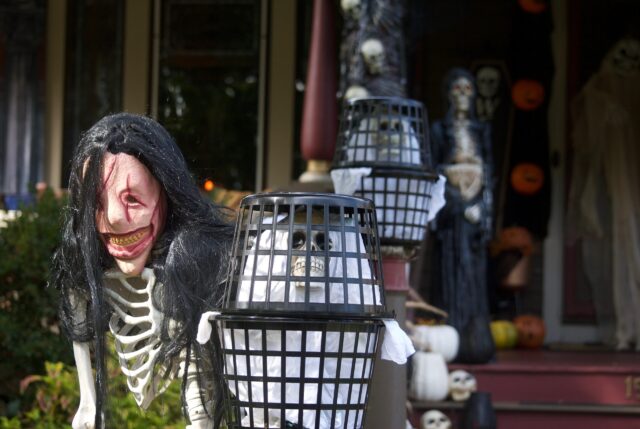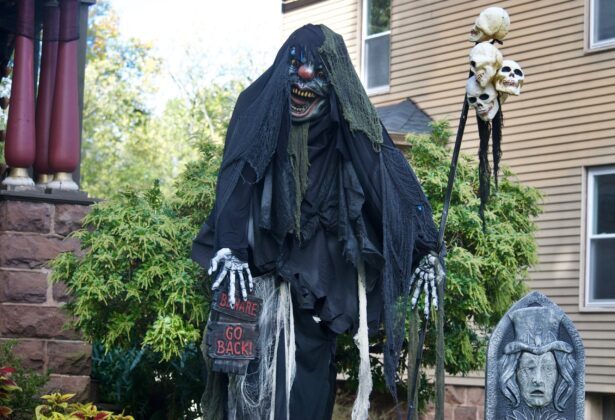What Halloween lets people — young and old — do is experience their neighborhood in a more direct way.
There isn’t the sense of just passing through that one gets from driving to and from. I sent video of this Halloween house (pictured) to a friend who I know drives by it frequently, and she did not know where it was. This is someone who has independently mentioned the house to me.
This is what I am talking about. The act of trick-or-treating is not just about getting candy, which is part of why trunk-or-treat is not a viable replacement. Neither is bringing carloads of kids to the mansion district. Sure, they get candy and are entertained, but what is the lesson taught? It’s one of extraction, of interacting with a certain population only when there is something to be gained (and that cuts both ways).
Halloween is getting to know one’s neighborhood better, and in a different light.

And it is getting to know who is in the neighborhood. On an average day, everyone might be rushing by to get the kids to school on time or to head to work. Halloween draws people onto their front steps and porches to greet visitors.
So much hateful, damaging rhetoric is possible because of othering. Many adults teach many children, along with other adults, to be wary of strangers, to the point that it is possible to see them as less than human. If you aren’t seeing how this is playing out internationally right now, you aren’t paying attention.
Reinforced anonymity and what I’m calling the Cult of “Mind Your Own Business” makes it easy for people to do everything from toss trash on a neighbor’s lawn to justify war crimes.
There are those who value whatever “minding your own business is,” and I wonder about this. It comes up in news pieces often following some sort of calamity, usually involving guns. “So-and-so always kept to himself, minded his own business” as if that were a badge of honor.
The phrase “mind your own business” is one that I have heard come out of people’s mouths when they’ve been called out for doing something wrong, because they don’t want to be taken to task. Years ago I heard it from a couple who were fighting with each other and then beating their young child in a Target store in Connecticut. The child could not have been older than five or six; this was not a spanking.
They did not want to hear that others disapproved of the child abuse they were openly engaged in, in plain sight, inside of a department store. The store manager was uninterested in doing anything, encouraging me to call the police if I thought there was a problem. This has stuck with me because our way of handling folks’ problematic behavior is to either “mind our own business” or get the law involved, which is likely to bring more harm to the child. There needed to be more adults in that room, telling the child’s parents that their actions were out of line and dangerous. What I wanted to be able to do was bring some kind of family therapist in right then and there, who could assist the parents, and also the child. But how do we make that happen in our current system without adding trauma for a child seeing their own parent handcuffed? Because that seems to be the way it works now. That we can’t offer assistance without sending out people who pop culture tells us again and again are out to get the “bad guys.” Is it helping that child to teach them that their parents are bad, when the truth is more that they are out of their depth and could use help?
In this case, I hope the child felt for a minute that someone else noticed and cared what happened to him. I don’t know what kind of home that kid was living in. Were there guns? Was he punished by being deprived of food? If the adults were willing to assault the child in public, I can’t imagine what they did in private was better.
If this were a family I knew, not just one I happened upon in a store I rarely went to, there would have been more that I could do. There is the possibility of asking the child how they are when they pass by every day, letting them know in a small way that they mattered. There’s the ability to suggest, outside of the moment, that the people who should be the adults are visibly stressed, and there is assistance available. Someone does not go from zero to beating their child in a public place. There’s a lot going on in between, and lots of opportunities for those in their lives to intervene before adults begin acting like toddlers (toddlers with a height, weight, and strength advantage).
I wonder if there was anyone in this family’s life who made it a point to get involved, to offer support and advice. Or, if they had surrounded themselves with people who would not ask questions.
When there are news headlines about people who’ve neglected their children — routinely or on one occasion with the worst possible results — I ask the same. Did they have a regular support system? I’m not talking about DCF. Regular people in their lives who would check in and assist. Or were all their relationships with people who did not ask questions.
We encase ourselves in this nostalgia for a past where neighbors watched out for neighbors, but in much of our culture, we behave antithetically to that. I am lucky to be in a neighborhood where people will redirect others’ kids who are acting out when playing in the street, but I know this is not the norm.

The norm still appears to be outsized fear of strangers. I’ve listened to adults tell other adults that it is dangerous for them to walk to their cars alone at night in Hartford . . . because of this wild fear of strangers. I’ve listened to adults spew horrifying rhetoric over the last week about how justified their side is in committing atrocities against innocent civilians — a worldview made possible through dehumanizing propaganda. Brought to you by the Fear of Strangers.
Most people are not violent. Most people are not kidnappers. Most people are not interested in cutting off someone’s food supply. Most people are not shooting guns off in the streets. Most people are not waiting to mug someone in a dark parking lot.
From the endless mass shootings in this country, we have seen endless profiles that indicate how people rarely “snap” with no warning.
We would know this if we wanted to know it, if we took the time to understand who is around us — in our neighborhood, the next town, another country. We would know in undeniable ways that it’s not a them doing the violence while the us are completely innocent of or justified in doing the same degree of harm. We would know that no sides are right because there aren’t sides, not in the way we’re sold on. Injuring another injures the self. Minding one’s own business when there is reason to intervene is another form of doing the injury.
For those leaning into anti-social behaviors, we could be steering them away. What is the typical response though? Statements as if factually, everyone in an area behaves this way. As if everyone has decided to pick up guns, launch rockets, throw stones when that is not the case. Statements that indicate this is the way it has always been and will always be, validating someone’s decision to remain in an us/them mindset and do nothing.
We are at a time when people will tell you — some of them running for office — that we need more police on our streets, even after it has been demonstrated that a large police force has not prevented crime. You will hear how war is necessary to resolve an ongoing conflict. This is trying to solve the problem by increasing the problem, except, importantly, it is worth asking if they are indeed trying to solve the problem, or simply come in after the fact to punish. Those things are not the same. I want the world where teens aren’t being gunned down outside their homes, where people aren’t being murdered at a kibbutz. I don’t want the world where we tacitly allow these things to happen, putting our efforts into the retaliation instead of prevention.
Obviously — and I should not even have to say this but I know if I don’t it will need to be spelled out for someone in the comments — it’s not that trick-of-treating alone is going to save the world. It’s creating atmospheres in which all people can learn more about where they live in order to feel connected to and pride in the place, and it is creating an atmosphere in which all people are willing to get to know others, on at least the most basic level that allows them to understand that these are also humans, equally deserving of safety, shelter, food, and human dignity.


Mutual Aid – Real Hartford
[…] This goes beyond the drive to eliminate the day or move it into sanitized (and frankly, boring) environments. […]